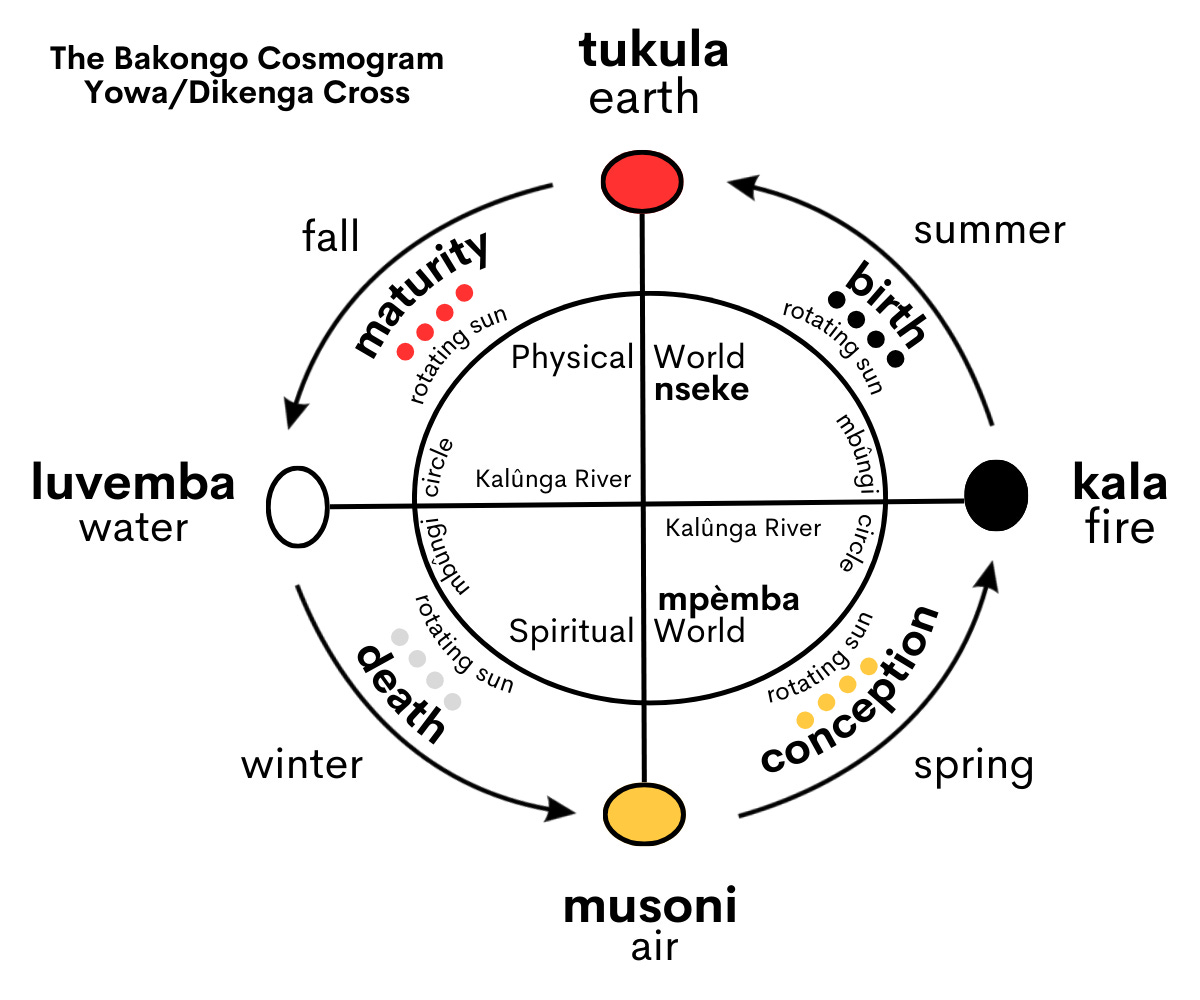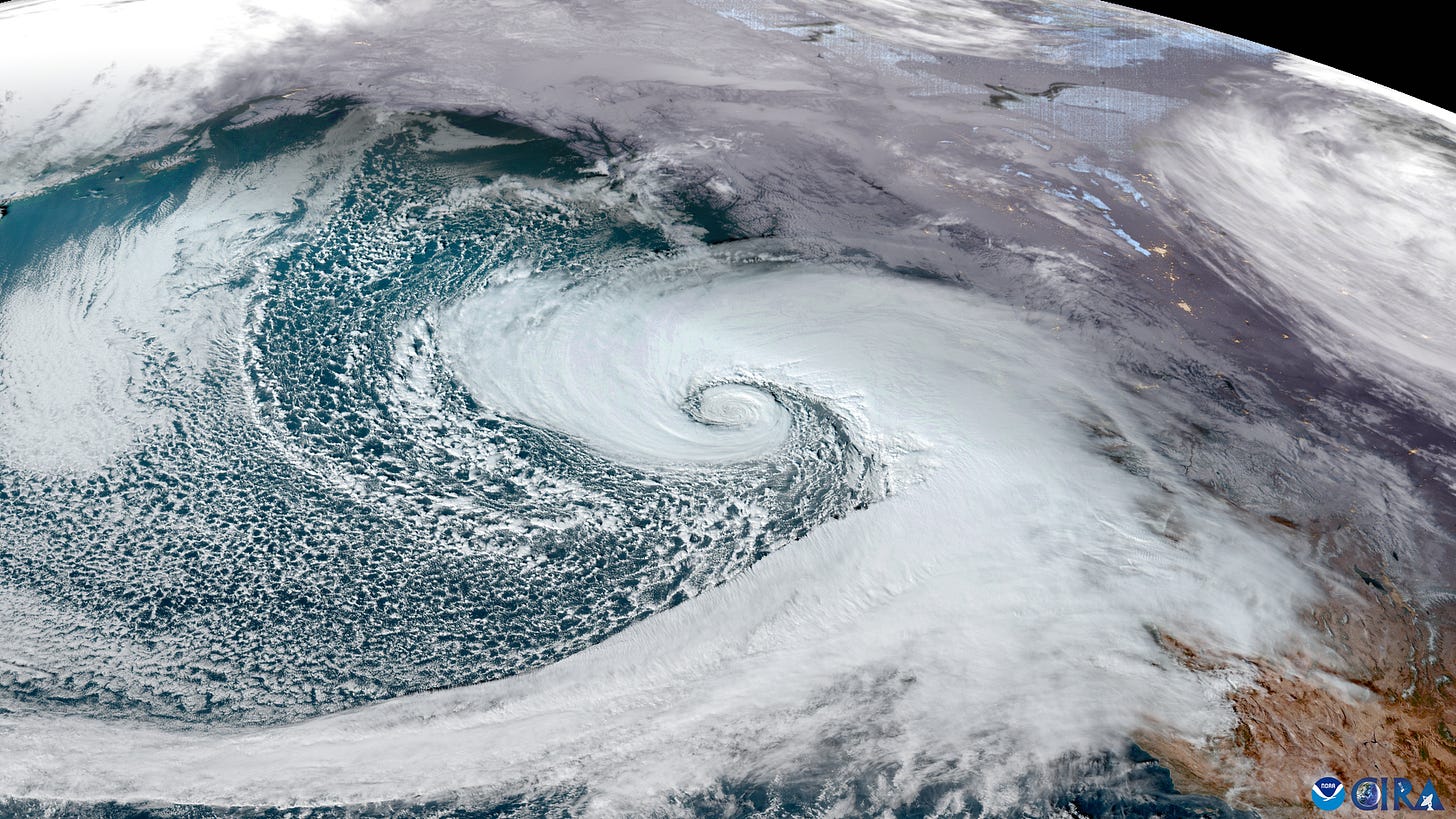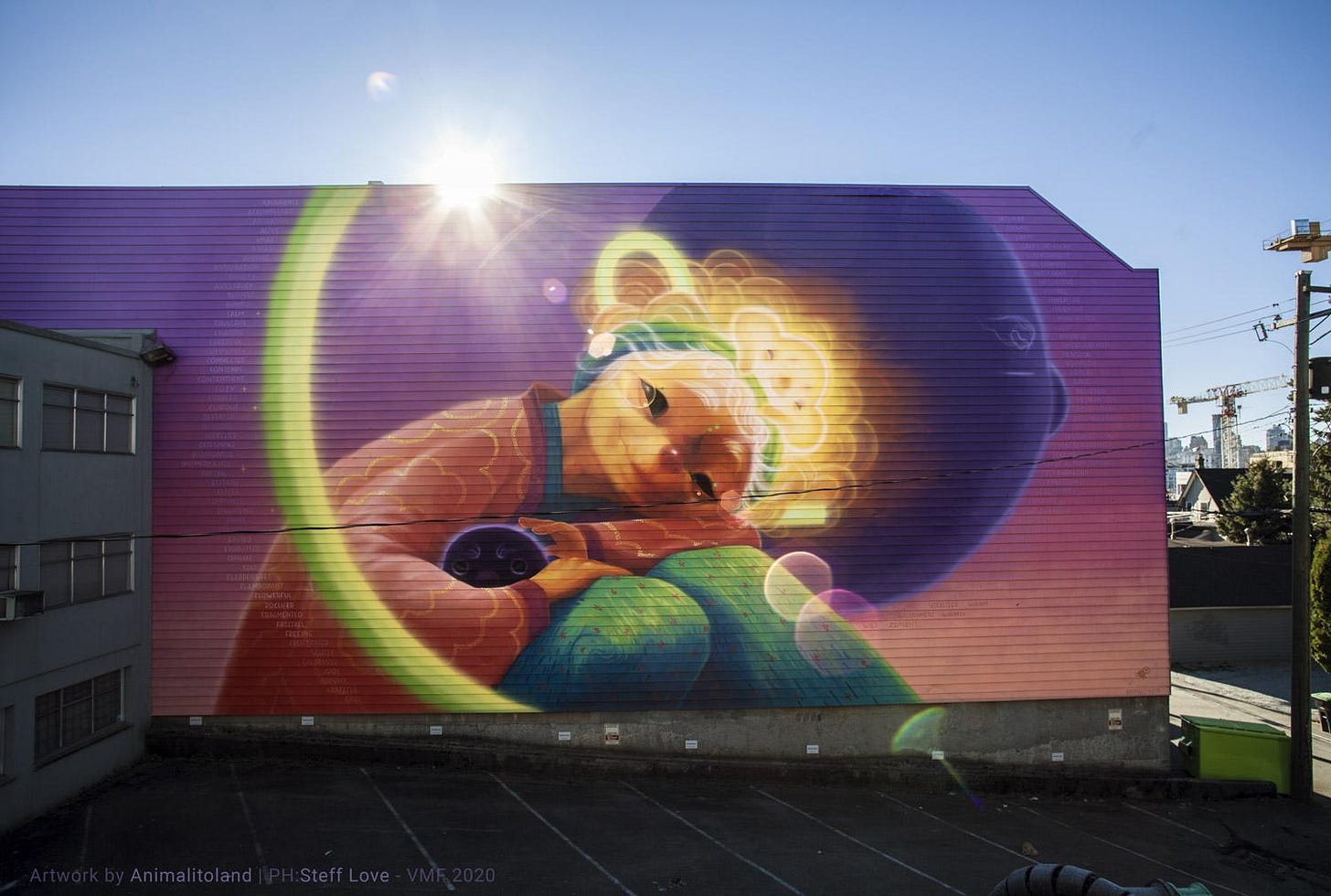Everything, everywhere, all at once
Part 4: Moving through the psychological storms of the "fourth” trimester
Ah, the “fourth” trimester. Like the final term at university as we head into finals, our initiation into parenthood is a big test, a “take-home” exam if you will: We are discharged from the hospital and left to our own devices to see how well we fare without all those healthcare supports, solely relying on ourselves, our parental instincts, and whatever resources we managed to prepare, buy, organize before go-time.
Except the only way to really do well is to learn as we go; no amount of studying can prepare us for parenthood, and perhaps least of all, the fourth trimester, those first three months of our little one’s life when we still call them a newborn, when they are still so little (as little as they’ll ever be). As their tiny curled-up bodies begin to go through the first of their many growth spurts, we, as parents, go through our own. As their bodies build up with antibodies, we build our own resilience. As they cry, we cry (though our cries are deeper, more brooding). When they furrow their brow and turn tomato red, we tense up with them, and when they smile (to finally pass that gas), we smile and have a gas, delighted in what joy their comfort brings us. It’s quite the dance.
They are so delicate, yet at the same time so bendy, so tough.
And so are we.
Parenthood is teaching me to be gentle in ways I never knew. And to toughen up in the right places so I can weather the storms. Because let me tell you, if I gave those storms names like we do with hurricanes, I’d already be well through the alphabet!
Postpartum prep
Friends who delivered their own babies often referred to “the fourth trimester” as they nudged gentle advice my way to help prep me as I neared my own due date. One friend dropped off a postpartum kit, a hint that not all difficulties would orbit around baby. The fourth trimester was about baby’s growth but also about mom’s physical state and recovery.
I looked inside the kit and promptly sent a line of Whatsapp messages inquiring about the items. Turned out the aerosol can was a pain reliever, the “pink undies” actually adult diapers. Another friend dropped off a bag of ice packs—frozen pads—and a home-made spray of soothing witch hazel.
People also warned me of the emotional rollercoaster that would come. “Day four,” one of Jason’s cousins said to me at my baby shower. “You’ll just curl up and cry and no one will be able to fix it.”
A midwife mentioned hormone levels: “You’ll go from the highest high in your life to the lowest, most major depletion, the sharpest of drops. Be prepared.”
“Okay,” I said, nodding to all of it. I felt similarly as I did when I received the postpartum items—lucid and callowly confident. As a person long trainedin managing my depressive episodes and melancholia, I thought I knew what they were all on about. I had a healthy relationship to pain and difficulty, an arsenal of tools to battle inner demons, to push through. Mind over matter.
But when the storms finally hit—for me, on day 5— the ache came from a place I didn’t know I had. It hit me like tidal waves. By day 10, it felt like I’d been bashed around by all four seasons of the weather. I feared it would develop into postpartum depression. But Jason, my community, and my writing saved me from teetering over into the abyss in those early weeks.
The first ten days or so we spent cocooned in our bedroom and my feet only touched the floor in so far as to take myself to the bathroom. Fortunately, my physical recovery was quick and rather painless and I was sitting normally within the week. Jason served me meals, picnic-style, on our mattress with such tenderness. Our cats Rupert and Rennie became cuddle monsters; never being particularly cuddly, they were now purring and wedging themselves into crevices made by our bodies. We watched them at all hours taking turns to guard our new pack from the edge of our bed and curiously sniffing Nora’s little head when we lay her down next to them for short introductions.
And all of this made me weep. The emotions hit like a tsunami out of nowhere.
The first week of blissful shock had been the calm before the storm. Then Week 2 came with its endless deluge of hormones that had me changing moods from light to dark like a shifting sky in a time-lapse video. Storms passed, floods inundated me. Anything and everything would set me off and then I’d be gone for hours, rocking, trembling.
Cycling through the four cardinal emotions of the “fourth” trimester
Such a complexity of emotions swirled inside me the following two weeks, all asking to be felt at once and by a heart that now felt at once the most fragile and the most powerful…
In crying all those tears and now writing about them though, I’ve come to appreciate their nuance and colouring. I see now that they shared a common source: a universal pool of human experience in its most elemental form. Their taste was of a wide and expansive variety.
The first emotion I felt was love, right in the hospital bed on Day 2. I didn’t know it was just the beginning. It lasted for three days and is a period of time that I hold to be the most sacred and treasured time I have ever lived.
It surged from within me like a geyser each time I looked at my little baby, touched her soft skin. I’d tapped into the sheer amount of love I had for this creature. At times of total exhaustion and bodily discomfort, waves of joy swept over me. She was worth it all, and more.
I swam in gratitude for how absolutely lucky I was to be alive to get to experience this, to have Jason by my side, loving me, loving her. To have so many loved ones step up to help us, the women in my life who offered words of encouragement and camraderie; the meals that were dropped off on our patio so selflessly without even an expectation of a thank you.
The support continued to overflow for the following weeks helping to temper the other emotions that followed. And all through it, I wept the biggest and happiest elephant tears. On day six though, the tide began to turn. Those tears of joy turned hot. I wept earth-crumbling tears in fits of rage.
I raged at the reality of female suffering, how isolated women have been in this world, the pain we carry, so often in isolation because of patriarchy and emotional neglect that stems from centuries of intergenerational trauma.
I thought of the medical systems that sluiced women with pain and trauma at their most vulnerable time, a state without which none of us would be here.
The following week, in Week 3, my anger turned to grief. This is the deepest, saddest, darkest place I have ever been. I carry it with me to this day, this knowledge that such a place exists and that I dwelt there for a time.
I have learned from it, too, now that I’ve come up for air, how essential it is to feel this utmost sadness in order to be truly human—that is: mortal. But at the time, it drowned me.
I broke through the wall of anger, tapping into what made me angry: That we are given only so much time to enjoy the beauty of this life and that we are not all gifted equal circumstances from which to forge our capacity to feel joy.
I started grieving for all the time I’m already losing with my little Nora already, both objectively because she would grow up, but also conceptually, because my memory was fading.
Each day spent together is one more but also: one less.
Each day was disappearing into weeks, then months, then years. What would be of our life together? How would I hold on?
Fear came next.
While I slept soundly next to her, naturally worries came up, which were all fortunately not cause for concern and resolved with prompt answers from our midwives (her toenails are a bit concave—normal. There is a red birthmark on the back of her neck—we call that the stork’s bite; it will fade.) In the first week she was even gaining weight just on my colostrum. But a few days later, we learned she’d dropped 80 grams despite my best efforts and dedication (I nursed for eleven, twelve, hours straight through some of those early nights). But my milk just wasn’t enough. It was time to supplement.
Grief took over again—that I couldn’t nurse her. That I’d have to pump myself out like a cow. That instead of holding her, I’d have to sit with a machine.
Then the anger returned. I’d sit there with my breast pump hooked up enraged at the bottle, at the formula, that it could offer what I couldn’t. It became all about me and what I had wanted rather than what was best for her.
But fear came to the rescue again—I had to put myself aside for the benefit of her wellbeing, otherwise she would be in danger. Fed was best, regardless of how I felt about it.
Then joy: when we took her for a weight check and she’d hit her goal.
I still struggle on our feeding journey, though less with each passing day as I learn to better cycle through these emotions. They all are instrumental. I need them all.
Like when I packed what remained of that postpartum kit for another friend who is due to deliver later this summer, I began weeping hot tears again, a volcano of anger rising in my throat. I hadn’t really needed anything in that kit but as I put an adult diaper away into a Ziploc bag, my eyes closed and I fell deep into myself. I finally understood.
Though I did not experience it myself, not quite, I understood viscerally, in the marrow of my being, the pain that so many birthing women go through, from C-sections to emergency interventions. I cried for them in solidarity, empathy. Grief found its way back into me, but then love… I began to cry for me, for being so lucky. Even my fortune had a tinge of bitterness though, for I could not share it with other women, those that came before me and those yet to be born.
It became too much, so I escaped back into anger. What of the women—the girls— who were left alone and helpless? I couldn’t fathom going through postpartum alone. In a country that didn’t respect women. I began to weep for all the mothers who had to do this without any support, left to tend to a child on their own, abandoned. I hated the men of the world. All of them except Jason.
Everything, everywhere, all at once
I observe Nora when she sleeps and I see these same weather systems move across her face. I wonder what dreams or visions she is having and though I can’t know for certain, I imagine a storm building, thrashing, then subsiding. I wonder are we both navigating similar psychological terrain? I think so.
Without joy, there’d be no point, no meaning.
Without anger, not impetus, no motivation.
Without grief, no tenderness, no connection.
Without fear, no instinct.
I’m not the first to have observed such categories or patterns. It’s a thing. Ethnographically speaking, many cultures mapped emotions and human experiences into a broader cosmology aligned to the four seasons, four elements, four cardinal directions. The base foundations of all life.

Aristotle gave it a go when looking at the mechanics of rhetoric and persuasion—what arouses us to make decisions and form opinions. American psychologist William James named the four I named above, in 1890, by theorizing, for the first time in psychological study, that emotions arise from bodily sensations. Descartes called them passions. Darwin explained them as evolutionary and biological traits.
But regardless of culture, speciality, or creed, the resounding conclusion appears to be that all these dimensions of experience are essential. Each has a part to play, whether we see them as something that constructs our experience or something that is constructed by our experience.
All we can do is be there for all of it. Rather than be the storm, if you will, we can hold onto each other and be storm watchers, appreciating our existence, our survival and our thriving, in all its glory.
That’s what I continue to do now as best as I can—be a witness to this experience as much as the experiencer. For myself and for Nora, I am working hard to hold compassion for myself when I fall so that I can stay strong for her when she struggles. We are in this awful, awesome, awe-ful storm together and I wouldn’t want it any other way.
xx
Vish
p.s. I leave you with a photo of my most favourite mural in Vancouver, just down the street from where I live. I think it perfectly captures everything about what I’ve written here. Enjoy!



